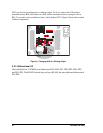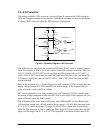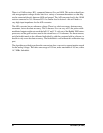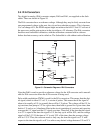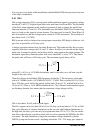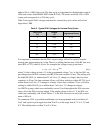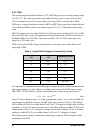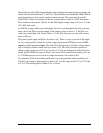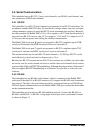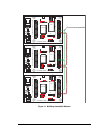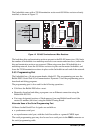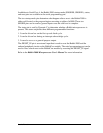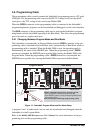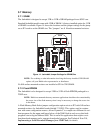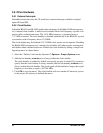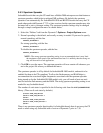
28 Jackrabbit (BL1800)
3.5 Serial Communication
The Jackrabbit has two RS-232 (3-wire) serial channels, one RS-485 serial channel, and
one synchronous CMOS serial channel.
3.5.1 RS-232
The Jackrabbit’s two RS-232 serial channels are connected to an RS-232 transceiver, U4,
an industry-standard MAX232 chip. U4 provides the voltage output, slew rate, and input
voltage immunity required to meet the RS-232 serial communication protocol. Basically,
the chip translates the Rabbit 2000’s 0 V to +Vcc signals to ±10 V. Note that the polarity is
reversed in an RS-232 circuit so that +5 V is output as –10 V and 0 V is output as +10 V.
U4 also provides the proper line loading for reliable communication.
The Rabbit 2000 serial port B signals are presented as RS-232 compliant signals TXB
(serial port B transmit) and RXB (serial port B receive) on header J5.
The Rabbit 2000 serial port C signals are presented as RS-232 compliant signals TXC
(serial port C transmit) and RXC (serial port C receive) on header J5.
The maximum baud rate for each RS-232 serial channel is 115,200 bps. RS-232 can be
used effectively at this baud rate for distances up to 15 m.
Because two RS-232 transmit and two RS-232 receive lines are available, one serial chan-
nel can be used for serial transmit and receive, and the other serial channel can be used as
a general digital I/O for RTS/CTS handshaking.
Although the present release of Dynamic C
does not support RTS/CTS handshaking in its libraries, it is possible to write your own
software.
3.5.2 RS-485
The Jackrabbit has one RS-485 serial channel, which is connected to the Rabbit 2000
serial port D through U6, an RS-485 transceiver.
U6 supports the RS-485 serial communica-
tion protocol. The chip’s slew rate limiters provide for a maximum baud rate of 250,000 bps
.
The half-duplex communication uses the Rabbit 2000’s PD5 pin to control the data enable
on the communication line.
The Jackrabbit can be used in an RS-485 multidrop network. Connect the RS-485+ to
RS-485+ and RS-485– to RS-485– using single twisted-pair wires (nonstranded, tinned)
as shown in Figure 11.



